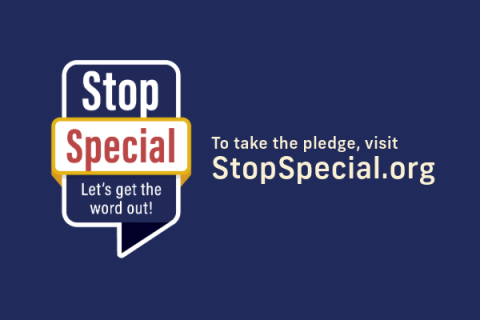Disability Rights Organizations Across the Nation Commit to “Stop Special”

CONCORD, N.H.— In anticipation of Disability Pride Month, disability organizations join advocates in launching Stop Special, calling for an end to the word “special” to describe people with disabilities. The campaign is grounded in feedback received from people with disabilities and reflects their opinions and preferences. Although still used in law and public policies, the term “special” is increasingly considered condescending and offensive to disabled people and their allies.
“We are not special. We are brave and we are cowards. We are strong and we are weak. We are kind and we are cruel. We are persistent and we are lazy. We are human. We are not special. We deserve equitable access to our schools, communities, health care and housing. Not special spaces and programs that continue to segregate and ostracize us. No more special!” said Jim and Pat Piet, members of the disabled community.
Calling disabled people “special” sets them apart from others and can imply they are somehow broken, less than, or deficient. Language is evolving, and like the R-word before it, the time has come to honestly discuss and understand how euphemisms like “special needs”, “special education” and “special” more generally, harm and undermine the long-term fight for disability rights, equality, and justice.
“We recognize that this may not be an easy change, especially for those of us who regularly work with laws and regulations that contain this term. Mainstream rejection of the r-word has taught us that it can take years for the law to catch up to the community,” said Stephanie Patrick, Executive Director of the Disability Rights Center - NH.
“It comes down to this, people with disabilities have asked us not to call them ‘special’ and that is reason enough for us.” said Isadora Rodriguez Legendre, Executive Director of the NH Council on Developmental Disabilities.
The Stop Special campaign is supported with funding from the New Hampshire DD Act partners – the Institute on Disability at the University of New Hampshire, Disability Rights Center – NH, and the NH Council on Developmental Disabilities. Together, these partners support people with disabilities as they participate in all aspects of community life.
Visit StopSpecial.org to access tools and resources and Take the Pledge to get the word out and end the use of this harmful term.